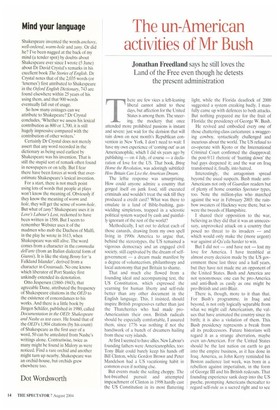Mind your language
Shakespeare invented the words anchovy, well-ordered, worm-hole and zany. Or did he? I've been nagged at the back of my mind (a tender spot) by doubts about Shakespeare ever since I wrote (5 June) about Dr David Crystal's remarks in his excellent book The Stories of English. Dr Crystal notes that of the 2,035 words (or 'lexemes') first attributed to Shakespeare in the Oxford English Dictionary, 743 are found elsewhere within 25 years of his using them, and that 900 words eventually fall out of usage.
So how many coinages can we attribute to Shakepeare? Dr Crystal concludes, 'Whether we assess his lexical contribution as 800 or 1,700. it is still hugely impressive compared with the contribution of other writers.'
Certainly Dr Crystal does not merely assert that any word recorded in the dictionary as being used earliest by Shakespeare was his invention. That is still the stupid sort of remark often found in newspapers or on telly. But I fear there have been forces at work that overestimate Shakespeare's lexical invention.
For a start, there is not much point using lots of words that people at plays won't know the meaning of. Obviously if they know the meaning of worm and hole, they will get the sense of worm-hole. But what of zany? Shakespeare uses it in Love's Labour's Lost, reckoned to have been written in 1588. But I seem to remember Webster uses it of the madmen who mob the Duchess of Malfi, in the play he wrote in 1613, when Shakespeare was still alive. The word comes from a character in the commedia dell'arte (from an Italian dialectal form of Gianni). It is like the slang Benny for 'a Falkland Islander', derived from a character in Crossroads. No one knows which liberator of Port Stanley first unkindly extended its denotation.
Otto Jespersen (1860-1943), that agreeable Dane, attributed the frequency of Shakespeare citations in the OED to the existence of concordances to his works. And there is a little book by Jurgen Schafer, published in 1980, called Documentation in the OED: Shakespeare and Nashe as test cases. He found that of the OED's 1,904 citations (by his count) of Shakespeare as the first user of a word, 50 can be antedated from Nashe's writings alone. Contrariwise, twice as many might be found in Malory as were noticed. Find a rare orchid and another might turn up nearby. Shakespeare was an orchid-house, but orchids grew elsewhere too.
Dot Wordsworth


























































 Previous page
Previous page